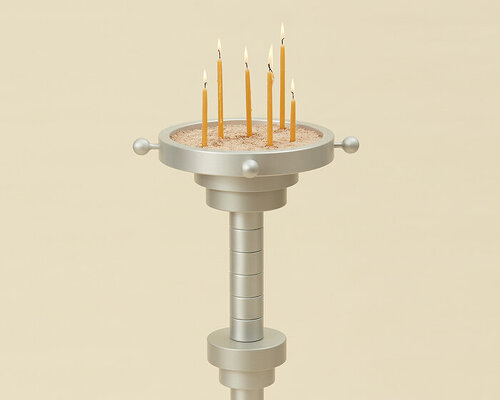Haritini Gritzali’s design references Greek traditional ceremonies
Objects of Service by designer Haritini Gritzali is a collection of objects that are both domestic and ritualistic. Deeply rooted in Greek tradition and its everyday ceremonies, it consists of objects that are both functional and symbolic, both grounded and spiritual, both familiar and enigmatic. Their materiality remains raw, pure, true to its essence. Their totemic forms and repetition of geometric elements unfold in a structured rhythm. Their sculptural presence embodies a quiet monumentality, standing not only as objects, but as markers of space.
all images by Aura Photography
compositions of cylinders shape Coat Stand and Candelabrum
The Coat Stand goes beyond mere functionality; it becomes a carrier of gesture. Traditionally, an object of service, designed to hold, to carry, here, it asserts its own sculptural purpose. In this solid walnut totem, the rhythmic composition of cylinders, each with its unique grain, highlights the individuality of the material while maintaining a sense of connection.
The Candelabrum introduces an exploration of both personal and collective rituals. Traditionally found in ecclesiastical spaces, designer Haritini Gritzali recomposes it here through a bold geometric form. Crafted from brushed aluminium, a material rarely used in such ceremonial objects, it creates an unexpected contrast. Industrial yet ceremonial, the Candelabrum stands with the austerity of a contemporary monastic relic.
Objects of Service bridges function and ritual through elemental design
Paravent and Vessel create a dialogue between mass and fragility
The Paravent introduces to Objects of Service a material carrying a distinct history. Brushed aluminum frames encase panels of cotton weaves that are carefully sourced from now-defunct Greek textile workshops. These fabrics are remnants of a traditional craft that has faded, yet their presence endures, each one holding a unique tone, texture, and memory. Delicately hand-covered buttons fasten the fabric to the frame, subtly contrasting with the industrial precision of the aluminum. The Paravent transforms the totemic verticality of Objects of Service into a defined yet open structure boundary that is both defined and open, moving between concealment and exposure.
The Vessel shifts between a stand-alone object and a container. Haritini Gritzali crafts Vessel from brushed brass, a material that enhances the duality. The weight and solidity of the metal carry a sense of permanence, while its empty space holds the delicate, creating a dialogue between mass and fragility. Over time, the brass develops a unique patina, reflecting the passage of time and revealing the object’s evolving character. The Vessel becomes a living piece, capable of holding water, flowers, and memory.
each piece draws on Greek tradition and domestic ceremony
the Candelabrum reinterprets a sacred typology in brushed aluminum
totemic forms establish presence—part object, part spatial marker
geometric repetition builds a quiet rhythm across the collection
solid walnut cylinders shape up the sculptural Coat Stand
geometry replaces ornament in a restrained, monastic silhouette
brushed brass captures light, weight, and evolving patina
the Vessel holds tension between solidity and absence
recovered textiles from Greek mills introduce layered histories
hand-covered buttons subtly link fabric to frame
the Paravent frames woven cotton within aluminum structure
project info:
name: Objects of Service
designer: Haritini Gritzali | @haritini.gritzali
photographer: Aura Photography | @aura.photography
designboom has received this project from our DIY submissions feature, where we welcome our readers to submit their own work for publication. see more project submissions from our readers here.
edited by: christina vergopoulou | designboom
The post haritini gritzali crafts objects of service, a collection of domestic and ritualistic totems appeared first on designboom | architecture & design magazine.

